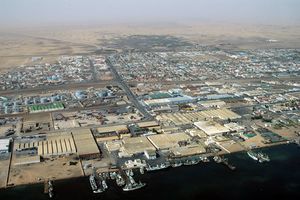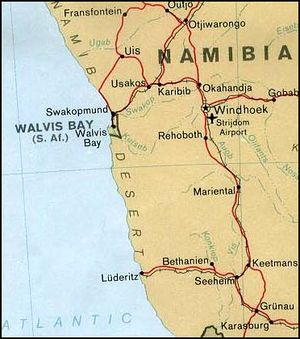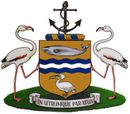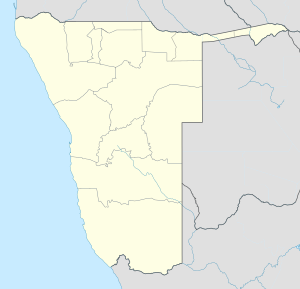والڤس بـِيْ
والڤس بـِيْ
Walvisbaai Walfischbucht | |
|---|---|
City | |
| Walvis Bay | |
 May 2005 aerial photograph of the harbour area | |
| الكنية: windwaai baai | |
| الشعار: In utrumque paratus (Latin = Prepared for either) | |
| الإحداثيات: 22°57′22″S 14°30′29″E / 22.95611°S 14.50806°E | |
| Country | |
| المنطقة | Erongo Region |
| Established | 1840 |
| الحكومة | |
| • Mayor | Uilika Nambahu |
| المساحة | |
| • الإجمالي | 1٬124 كم² (434 ميل²) |
| التعداد (2016)[1] | |
| • الإجمالي | 100٬000 |
| منطقة التوقيت | UTC+1 (WAT) |
| • الصيف (التوقيت الصيفي) | UTC+2 (WAST) |
| Climate | BWk |
والڤس بـِيْ (Walvis Bay؛ Afrikaans Walvisbaai, German Walfischbucht or Walfischbai, all meaning "Whale Bay") is a city[2] in Namibia and the name of the bay on which it lies. The town has 100,000 inhabitants and covers a total area of 29 متر كيلومربع (11 sq mi) of land.[3]
The bay is a safe haven for sea vessels because of its natural deepwater harbour, protected by the Pelican Point sand spit, being the only natural harbour of any size along the country's coast. Being rich in plankton and marine life, these waters also drew large numbers of southern right whales,[4] attracting whalers and fishing vessels.
The Dutch referred to it as Walvisch Baye and the English as Whale Bay. In its eventual formal incorporation, it was named Walfish Bay, which was changed to Walvish Bay, and ultimately to Walvis Bay. It has also been referred to as Walwich Bay[5] or Walwisch Bay.[6] The Herero people of the area called it Ezorongondo.[7]
A succession of colonists developed the location and resources of this strategic harbour settlement. The harbour's value in relation to the sea route around the Cape of Good Hope had caught the attention of world powers since it was discovered by the outside world in 1485. This explains the complicated political status of Walvis Bay down the years.
The town is situated just north of the Tropic of Capricorn in the Kuiseb River delta and lies at the end of the TransNamib Railway to Windhoek, and on the B2 road.
Walvis Bay, with its large bay and sand dunes, is an important centre of tourism activity in Namibia. Attractions include the artificial Bird Island, centre of a guano collection industry, the Dune 7 sand dune, the salt works, the abundant birdlife, and a museum. Kuisebmund Stadium, home to two clubs in the Namibia Premier League, is also located in the city. The beach resort of Langstrand lies just a few kilometres north. The Walvis Bay Export Processing Zone is an important facet of the local economy.
التاريخ

Portuguese navigator Diogo Cão reached Cape Cross, north of the bay, in 1485.[8] There followed Bartolomeu Dias, who anchored his flagship São Cristóvão in what is now Walvis Bay on 8 December 1487, on his expedition to discover a sea route to the East via the Cape of Good Hope.[9] He named the bay "O Golfo de Santa Maria da Conceição."[10] However, the Portuguese did not formally stake a claim to Walvis Bay.
Little commercial development occurred on the site until the late 19th century. During the scramble for Africa, the British Empire occupied Walvis Bay with a small area surrounding the territory., They permitted the Cape Colony to complete the annexation of the territory in 1884, following initial steps which had been taken in 1878.[11]
In 1910, Walvis Bay, as part of the Cape Colony, became part of the newly formed Union of South Africa.[12] Subsequently, a dispute arose with Germany over the exclave's boundaries, which was eventually settled in 1911, with Walvis Bay being allocated an area of 1،124 متر كيلومربع (434 sq mi).[13]
The exclave was overrun by the Germans during the South West Africa Campaign early in the First World War, but South African Forces eventually ousted the Germans in 1915.[14] Subsequently, Walvis Bay was quickly integrated into the new martial law regime established in South West Africa.[15]
South Africa was later awarded control (a Class "C" mandate) over South West Africa by the League of Nations to administer the territory.[16] Civilian rule was restored in South West Africa in 1921 and administration of Walvis Bay was transferred to South West Africa under the South West Africa Affairs Act of 1922.[17]
Despite the territory never having been part of German South West Africa, the Act stated that: "the port and settlement of Walvis Bay, which forms part of the Cape of Good Hope, shall for judicial and administrative purposes be regarded as if it were part of the mandated territory of South West Africa".[13] However, South Africa had also sought to annex South West Africa itself, and had presented such a proposal to the League of Nations.[11] Consequently, in 1949, the Act was amended to give representation in the Parliament of South Africa to whites in South West Africa.[18]
In 1977, following increasing international pressure to relinquish its control over South West Africa, South Africa repealed the Act, but transferred control of Walvis Bay back to the Cape Province, thereby making it an exclave.[19] From 1980, it was represented in both the Provincial Council and the House of Assembly as part of the Green Point constituency in Cape Town, before becoming a separate constituency in 1982.[20]
In response, the United Nations Security Council passed Resolution 432 (1978), which declared that "the territorial integrity and unity of Namibia must be assured through the reintegration of Walvis Bay within its territory".[21]
In 1990, South West Africa gained independence as Namibia, but Walvis Bay remained under South African sovereignty, with South Africa increasing the number of troops.[22] However, in 1992, the two countries agreed to establish a transitional Joint Administrative Authority for Walvis Bay and the Offshore Islands.[23] The Authority was headed by two Chief Executive Officers, Nangolo Mbumba, then Secretary to the Namibian Cabinet, and Carl von Hirschberg, former South African Ambassador to the United Nations.[24]
In August 1993, prior to the end of apartheid, the Multiparty Negotiating Forum in South Africa passed a resolution calling for "the incorporation-reintegration of Walvis Bay and the Off-Shore Islands into Namibia." [25] The Transfer of Walvis Bay to Namibia Act was passed by the Parliament of South Africa that year.[26] Following the signing of a treaty between the two countries, South Africa formally transferred sovereignty of Walvis Bay and the Penguin Islands to Namibia on 1 March 1994.[27]
المناخ
| بيانات المناخ لـ Pelican Point، والڤس بـِيْ (7 م)، ناميبيا (1958-1984) | |||||||||||||
|---|---|---|---|---|---|---|---|---|---|---|---|---|---|
| الشهر | ينا | فب | مار | أبر | ماي | يون | يول | أغس | سبت | أكت | نوف | ديس | السنة |
| القصوى القياسية °س (°ف) | 25.3 (77.5) |
26.4 (79.5) |
34.5 (94.1) |
35.0 (95.0) |
36.0 (96.8) |
32.5 (90.5) |
32.9 (91.2) |
33.4 (92.1) |
31.3 (88.3) |
27.5 (81.5) |
28.3 (82.9) |
25.5 (77.9) |
36.0 (96.8) |
| متوسط القصوى اليومية °س (°ف) | 20.0 (68.0) |
20.3 (68.5) |
19.6 (67.3) |
18.6 (65.5) |
19.0 (66.2) |
18.8 (65.8) |
17.8 (64.0) |
16.4 (61.5) |
15.8 (60.4) |
16.6 (61.9) |
17.7 (63.9) |
19.0 (66.2) |
18.3 (64.9) |
| المتوسط اليومي °س (°ف) | 17.6 (63.7) |
17.9 (64.2) |
17.2 (63.0) |
15.7 (60.3) |
15.6 (60.1) |
15.2 (59.4) |
14.1 (57.4) |
13.2 (55.8) |
13.2 (55.8) |
14.0 (57.2) |
15.3 (59.5) |
16.6 (61.9) |
15.5 (59.9) |
| متوسط الدنيا اليومية °س (°ف) | 15.2 (59.4) |
15.5 (59.9) |
14.7 (58.5) |
12.9 (55.2) |
12.1 (53.8) |
11.4 (52.5) |
10.3 (50.5) |
10.1 (50.2) |
10.7 (51.3) |
11.5 (52.7) |
12.9 (55.2) |
14.2 (57.6) |
12.6 (54.7) |
| الصغرى القياسية °س (°ف) | 10.5 (50.9) |
9.2 (48.6) |
10.5 (50.9) |
8.5 (47.3) |
7.0 (44.6) |
5.0 (41.0) |
3.4 (38.1) |
4.4 (39.9) |
6.1 (43.0) |
5.0 (41.0) |
8.5 (47.3) |
9.6 (49.3) |
3.4 (38.1) |
| متوسط تساقط الأمطار mm (inches) | 1.0 (0.04) |
2.0 (0.08) |
5.0 (0.20) |
1.0 (0.04) |
1.0 (0.04) |
2.0 (0.08) |
0.0 (0.0) |
0.2 (0.01) |
0.1 (0.00) |
0.1 (0.00) |
0.7 (0.03) |
0.1 (0.00) |
13.2 (0.52) |
| Average precipitation days (≥ 0.1 mm) | 0.6 | 0.8 | 1.1 | 0.5 | 0.4 | 0.5 | 0.0 | 0.4 | 0.5 | 0.4 | 0.6 | 0.4 | 6.2 |
| متوسط الرطوبة النسبية (%) | 87 | 87 | 89 | 89 | 86 | 81 | 82 | 86 | 89 | 88 | 88 | 88 | 87 |
| Mean monthly ساعات سطوع الشمس | 232 | 189 | 211 | 237 | 251 | 231 | 236 | 220 | 189 | 226 | 210 | 214 | 2٬646 |
| Source 1: Deutscher Wetterdienst[28] | |||||||||||||
| Source 2: Danish Meteorological Institute[29] | |||||||||||||
السياسة
Walvis Bay is governed by a municipal council that currently[تحديث] has ten seats.[30]
البلدات التوأم – المدن الشقيقة
Walvis Bay is twinned with:
 Lobatse in Botswana
Lobatse in Botswana Drakenstein in South Africa[31]
Drakenstein in South Africa[31] Kristiansand in Norway.
Kristiansand in Norway.
انظر أيضاً
معرض صور
Watching الحوت الأحدب في والڤس بـِيْ
Heaviside's dolphins jumping أمام والڤس بـِيْ
Cape fur seals hauling site
References
- ^ Hartman, Adam (5 July 2016). "Walvis Bay has long list of challenges which hamper services". The Namibian.
- ^ "Local Authorities". Association of Local Authorities in Namibia (ALAN). Retrieved 1 October 2012.
- ^ "ELECTIONS 2010: Erongo regional profile". New Era. 16 November 2010.
- ^ Southern Right Whale, Eubalaena australis, The Namibian Dolphin Project
- ^ Narrative of a voyage to the South Seas Charles Medyett Goodridge, Hamilton and Adams, 1832, page 16
- ^ The World of Waters or A Peaceful Progress o'er the Unpathed Sea, Fanny Osborne, R. Carter, 1852, page 337
- ^ Windhoek?! Rather make that Otjomuise Werner Menges, The Namibian, 12 May 2005
- ^ Foundations of the Portuguese Empire, 1415–1580, Diffie Bailey University of Minnesota Press, 1977, page 156
- ^ Historical Dictionary of European Imperialism, James Stuart Olson, Robert Shadle, Greenwood Publishing Group, 1991, page 170
- ^ Às portas da Índia em 1484, Abel Fontoura Costa, Imprensa da Armada, 1935, page 31
- ^ أ ب Succession of States and Namibian territories, Y. Makonnen in Recueil Des Cours, 1986: Collected Courses of the Hague Academy of International Law, Academie de Droit International de la Haye, Martinus Nijhoff Publishers, 1987, page 213
- ^ Debates of Parliament, Hansard, Volume 9, Issues 19-21, Government Printer, 1993, page 10179
- ^ أ ب Walvis Bay: exclave no more, Ieuan Griffiths, Geography, Vol. 79, No. 4 (October 1994), page 354
- ^ The War in Africa, David Killingray in A Companion to World War I, John Horne, John Wiley & Sons, 2012, page 119
- ^ Biennial Conference: Papers nos. 33-59, African Studies Association of the UK, 1996, page 5
- ^ The Namibian War of Independence, 1966-1989: Diplomatic, Economic and Military Campaigns, Richard Dale McFarland, 2014, page 67
- ^ Strategic territory and territorial strategy: the geopolitics of Walvis Bay's reintegration into Namibia, David Simon, Namibian Economic Policy Research Unit, 1995, page 8
- ^ Official Documents of the 4th Session of the United Nations General Assembly, United Nations, 1949, page 11
- ^ The Green and the dry wood: The Roman Catholic Church (Vicariate of Windhoek) and the Namibian socio-political situation, 1971-1981, Oblates of Mary Immaculate, 1983, page 6
- ^ Sub-Saharan Africa Report, Issues 2578-2584, Foreign Broadcast Information Service., 1982, page 48
- ^ Resolution 432 (1978) of 27 July 1978
- ^ Namibia Nears Freedom, But S. Africa Tugs On Its Lifeline, David Zucchino, Philadelphia Inquirer, January 14, 1990
- ^ Namibia Yearbook, Issue 3, pages 18
- ^ Country Report: Botswana, Namibia, Swaziland, Lesotho, Economist Intelligence Unit, 1992, page 13
- ^ Pretoria to quit Walvis Bay: Multi-party body's policy breakthrough, The Independent, 17 August 1993
- ^ No. 203 of 1993: Transfer of Walvis Bay to Namibia Act, 1993.
- ^ Treaty between the Government of the Republic of South Africa and the Government of the Republic of Namibia with respect to Walvis Bay and the off-shore Islands, 28 February 1994
- ^ "Klimatafel von Pelican Point / Walfisch-Bucht / Namibia" (PDF). Federal Ministry of Transport and Digital Infrastructure. Retrieved 4 November 2016.
- ^ "STATIONSNUMMER 68104" (PDF). Ministry of Energy, Utilities and Climate. Retrieved 4 November 2016.
- ^ "Know Your Local Authority". Election Watch. No. 3. Institute for Public Policy Research. 2015. p. 4.
- ^ Walvis strengthens ties with Drakenstein and Lobatse, Adam Hartman, The Namibian, 8 November 2011
للاستزادة
- Silverman, Melinda: Between the Atlantic and the Namib. An Environmental History of Walvis Bay, NWG, Windhoek 2004 – Namibiana Buchdepot
- de Beer, Charles: Namibia Marine Life, @tidude Graphix, Swakopmund o.J. – Namibiana Buchdepot
- Heemstra, Phillip; Smith, Margaret M.: Smith's Sea Fishes, Struik Publishers, Cape Town 2003
- Bridgeford, P. and M.: Cape Cross, Walvis Bay 2002 – Namibiana Buchdepot
- Vogt, Andreas: National Monuments in Namibia, Gamsberg Macmillan, Windhoek 2004 – Namibiana Buchdepot
External links
 Media related to Walvisbay at Wikimedia Commons
Media related to Walvisbay at Wikimedia Commons- Images from Walvis Bay
- Walvis Bay City Council
- Walvis Bay Airport Information
- Transfer of Walvis Bay To Namibia Act, 1993
- Namibia's Walvis Bay Issue – Origin and Rise of a Colonial Dispute (1992)
- Prime Minister Vorster Speaks on Walvis Bay, Associated Press, 30 July 1978
- Pages using gadget WikiMiniAtlas
- Short description is different from Wikidata
- Coordinates on Wikidata
- مقالات فيها عبارات متقادمة منذ November 2015
- جميع المقالات التي فيها عبارات متقادمة
- مدن ناميبيا
- أماكن ساحلية مأهولة في ناميبيا
- تاريخ جنوب أفريقيا
- Walvis Bay
- Port cities in Africa
- Former British colonies and protectorates in Africa
- Ramsar sites in Namibia
- Populated places in the Erongo Region
- جيوب خارجية
- Port cities and towns of the Atlantic Ocean
- Populated places established in 1840
- 1840 establishments in the British Empire
- تأسيسات 1840 في أفريقيا






